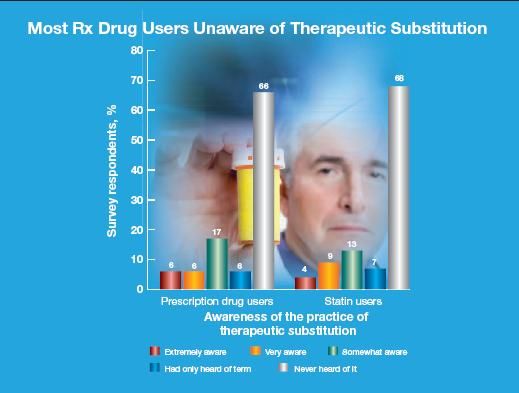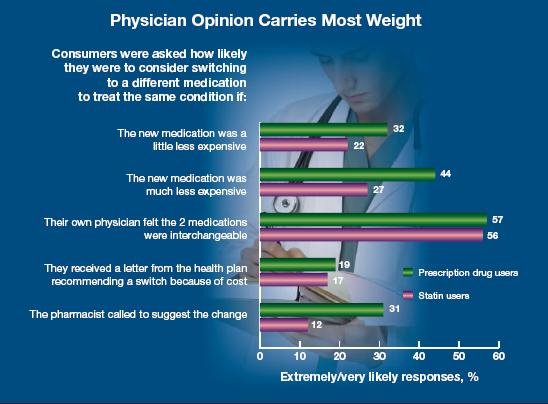- Clinical Technology
- Adult Immunization
- Hepatology
- Pediatric Immunization
- Screening
- Psychiatry
- Allergy
- Women's Health
- Cardiology
- Pediatrics
- Dermatology
- Endocrinology
- Pain Management
- Gastroenterology
- Infectious Disease
- Obesity Medicine
- Rheumatology
- Nephrology
- Neurology
- Pulmonology
Plan Members Express Concern AboutTherapeutic Substitution
Seventy percent of prescription drug users said they would be very concerned if a drug they were taking was changed to another drug in the same class without their physician's knowledge (Cover Figure). Concerns are greatly reduced, although not eliminated, if the physician is aware of and consents to the change, according to findings of a survey released by the National Consumers League (NCL).
Seventy percent of prescription drug users said they would be very concerned if a drug they were taking was changed to another drug in the same class without their physician's knowledge (Cover Figure). Concerns are greatly reduced, although not eliminated, if the physician is aware of and consents to the change, according to findings of a survey released by the National Consumers League (NCL).
Consumers are generally unfamiliar with the practice of therapeutic substitution and are unaware of how it can result in changes in their drug therapy. Two-thirds of prescription drug users surveyed said they “had never heard of” therapeutic substitution (Figure 1). Only 6% were aware of therapeutic substitution and understood that it involves replacing the prescribed drug with another, chemically different drug in the same therapeutic category.

Figure 1. Statin users were even less likely than general prescription drug users to be aware of the practice of therapeutic substitution.
The survey was conducted by Harris Interactive for the NCL and funded by an unrestricted educational grant from Pfizer. Two groups were surveyed: 1035 prescription drug users, and 352 users of statin medications; responses were similar.
Most prescription drug users (78%) “very much” favor an explicit requirement for health plans to consult the physician before any therapeutic substitution takes place, and a requirement that patients be notified (85%). Consumers are against health plans’ providing incentives to physicians (49% very much oppose) or pharmacists (55%) for switching patients to lower-cost alternative medications.
More than half (57%) of prescription drug and statin users would be more likely to switch to a different medication if their physician felt that the 2 medications were interchangeable than because of lower cost (Figure 2). Nearly one-third (31%) of prescription drug users would be extremely/very likely to switch if they were called by a pharmacist.

Figure 2. The physician’s opinion was significantly more important than cost for both prescription drug users and statin users in influencing the decision to switch to a different medication.
Prescription drug and statin users favor direct communication by health plans regarding options for therapeutic substitution but not overwhelmingly so, with 44% of prescription drug users and 49% of statin users saying they somewhat or very much favor such communication with 23% and 28%, respectively, opposed. Most would then discuss the alternative medication with their physician (71% extremely/very likely).
Overall, only about 1 in 5 prescription drug or statin users is likely to consider therapeutic substitution. Drug cost and seriousness of the disease are factors, with the likelihood of therapeutic substitution increasing for more expensive medications and for less serious conditions.
Prescription drug users consider health plans to have the most say regarding therapeutic substitution policies and appropriateness, with 70% describing them as very/extremely influential, followed by physicians/physician groups, with 40% of top scores. Consumers/consumer groups were ranked last, with 18%. Asked how various groups should be ranked, prescription drug users favored physicians/physician groups, with 77% considering them to be very/extremely influential, followed by consumers/consumer groups, with 48%.
By wide margins, prescription drug users support requirements that patients be notified if their prescription is changed, with 85% very much favoring, and that the prescribing physician be consulted before therapeutic substitution takes place, with 78% very much favoring.
Prescription drug users generally oppose health plans providing incentives to physicians (49% very much oppose) or pharmacists (55% very much oppose) to switch patients to lower-cost medications.
Despite widespread concerns regarding the practice, just 15% of prescription drug users experienced therapeutic substitution in the past 2 years. For only 1 in 3 did this substitution result in lower out-of-pocket costs. Approximately one-third (34%) did not feel that the substituted medication was as effective.
The survey report authors suggest that there is “a clear and pressing need” to educate consumers about therapeutic substitution. This includes clarifying the prevalence and processes by which therapeutic substitution occurs. Factors that drive consumers’ attitudes include the physician’s knowledge and approval, efficacy of the drug, and disease severity. Consumers especially value the physician's input and would also like to be involved in such decisions themselves.
The survey report authors conclude: “With sufficient transparency, involvement of doctors and consumers in the final decision on substitution particularly in instances involving treatment of serious conditions, and appropriate regulation of the practice, consumers may come to accept the practice of therapeutic substitution.”
Data for the Cover Figure and in the “Trend of the Month” are from Consumers’ Views on Therapeutic Substitution, a survey conducted by Harris Interactive for the National Consumers League. The complete report is available at http://www.nclnet.org/health/therapeutic_substitution.pdf.
